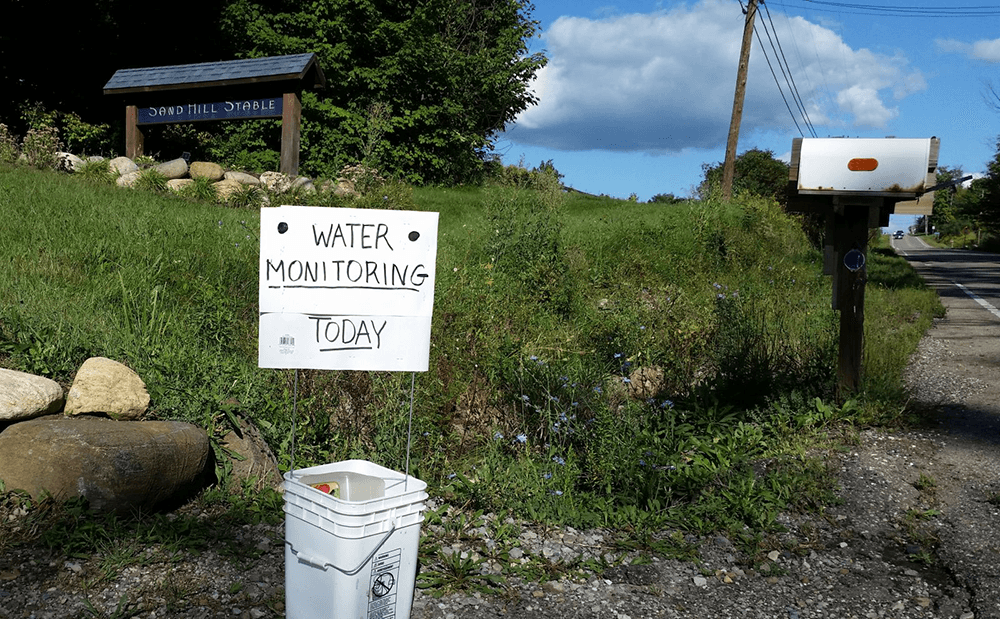Fearing pollution, some local governments are demanding back zoning control over oil and gas
In Ohio, concerned citizens can bring water from their wells to a monthly water monitoring program.
In eight states across the country, communities are trying to decide if new energy sources and possible economic growth from oil and gas are worth losing control of their land — and the huge changes it brings to the countryside.
Kathleen Chandler, a County Commissioner in Portage County, Ohio, worries when she sees truck after truck carrying waste into the county. An estimated 500 million gallons of fracking wastewater will be dumped in the county this year — and there’s nothing she can do to about it. “We have no control at the local level,” she explains. “The state took away our control.”
Ten years ago, Ohio changed its zoning laws. It took zoning control of oil and gas operations away from local communities and gave the authority to the state department of natural resources. In 2012, Pennsylvania also tried to limit local zoning rights around oil and gas operations, as part of the controversial Act 13. But late last year, the state Supreme Court struck it down, maintaining local control. New York courts have also upheld the rights of local governments to regulate fracking.
Randy Roberts, an attorney for Houston-based Stallion Oilfield, which owns three injection wells in Ohio’s Portage County, says it makes sense to decide energy development at the state level. “It’s akin to the federal government regulating drugs,” he says. “The FDA regulates drugs; each county doesn’t regulate what drugs you can take. It makes more sense for the state to do it than to have part-time zoning board[s] deciding whether someone can drill for oil and gas. They’re not educated in that area, and they don't have time to get educated in that area.”
Roberts knows some people don’t like it, but he says Ohio’s uniform state zoning regulations are attractive. “I’m not trying to be difficult here, but I would like to think that Ohio has made a pitch to be relatively benign,” he says. “They do not make regulations just for the sense of making regulations, but they want us to do our jobs. They come out here and inspect us and then they leave us alone if [they find] we’re doing our jobs.”
That oversight doesn’t always ease residents’ fears. Last winter, Portage Country resident Mary Hagan began worrying about the water in her family’s well after she saw the tinsel on her Christmas tree starting to shake. “They had that earthquake come out of Youngstown because of fracking,” Hagan says, “and we felt it up here in Shalersville. So, yeah, the concern is that it might contaminate our well — our water.”
Earlier this year, Ohio regulators acknowledged that some fracking operations near Youngstown, about 45 minutes east of Portage County, caused earthquakes.
Gwen Fisher, a retired university professor, worries that the disposal wells will fail — the pipes will leak, or the concrete surrounding them will crack, and the waste, laced with chemicals and possible radioactivity, will contaminate their drinking water.
“Everybody around these injection wells in these rural areas lives on their well water. If it goes bad, they’re going to have to buy water,” Fisher says. In Pennsylvania, the state has confirmed more than 240 cases where oil and gas operations have contaminated drinking water.
Some Ohio communities are trying to reassert their rights. People in the city of Kent, in Portage County, will vote on something called a "community bill of rights" this November. It’s an attempt to regain local rights around energy production sites. Five miles east, the city of Munroe Falls has a case pending before the Ohio Supreme Court. They’ve argued that the Home Rule law in the Ohio constitution overrides the state’s zoning law.
Gwen Fisher's husband sits on the local township board, which is in charge of most zoning decisions, and she says he sees the troublesome contradictions underlying this conflict all the time. “He will spend hours discussing with his fellow board members whether or not somebody can build a fence, or keep chickens, or put up a sign," she says. "And then the next day their neighbor could have leased land, and they could have a three-to eight-acre well pad or a pileline close to their house, and have no choice about it."
Energy companies, business groups and the state argued against Munroe Falls and other cities before the Ohio Supreme Court in February. A decision is expected soon.
This story is based on an interview that aired on PRI’s Living on Earth with Steve Curwood. It was reported by Julie Grant for the Public Radio program, The Allegheny Front.
Our coverage reaches millions each week, but only a small fraction of listeners contribute to sustain our program. We still need 224 more people to donate $100 or $10/monthly to unlock our $67,000 match. Will you help us get there today?
